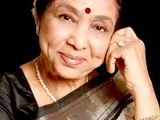R.D - Asha Interface
Author: Girija Rajenrdan- Screen - 14th April 1989
RD-ASHA INTERFACE
(SCREEN, 14th April 1989)
By Girija Rajendran
Through a quarter century and more, so stand-out is the music that Asha Bhosle-R.D.Burman duo has made, with the one compositionally complementing the other to a T, that I felt it was time they were brought face to face, the one to speak on the other, interacting in a style that would prove tunefully rewarding to the reader.
In a manner of speaking, the relationship between this singer-composer team is a mere continuation of the process that RD's father, S.D.Burman, had set in motion. Asha, remember, gave her vocal best to Sachin Dev Burman, before she came indelibly to be identified with Rahul Dev Burman for the uniquely infectious style in which she sang
Pancham's tunes.
Strangely, as the two admit, they have never before been asked to assess each other as a long-standing vocal-compositional pair who have come together in real life too. Whenever their names have been mentioned in tandem, it has been to pick up some unsavoury tidbit, contributing to the two's real common interest: music. Hence this idea of getting them to tune with each other. The idea so appealed to the duo that both Asha and RD cooperated enthusiastically to offer an insight into their evolution as a singer composer duo with a niche distinctly its own in the annals of our popular music.
As Asha and Pancham came together specifically for this interview in
R.D.Burman's music-room, I shot my first question at the singer: "When did you first come to realize that dada Burman's son, in his own way, is as gifted a composer as his father?"
"Why, Pancham used to rehearse me right from the time I came regularly
to sing for Dada Burman with 'Nau do Gyarah', some time in 1956, revealed Asha. "I remember demurring and telling Dada that it was with him, and not with his raw young son, that I wanted to rehearse 'Aankhon mein kya ji' for 'Nau do Gyarah', all the more so it was a duet with the impish Kishore Kumar. But Dada disarmed me by asserting that Pancham was every inch as good a music person as himself."
"What I didn't know then was that Pancham used to chip in to rehearse the singer only when the original tune-idea was his, as obviously. 'Aankhon mein kya ji' was likewise. I
recall Pancham coming into rehearse me for Dada's 'Teen Deviyan' duet with Kishore: 'Are yaar meri tum bhi ho ghazab'. However, when we were at such rehearsals, Pancham never let it on that the tune was, in actual fact, his handiwork.
But soon after, when I came to sing for Pancham in 'Pati Patni', a film he himself was scoring, I realized that the solo for it he wanted me to render, 'Maar Dalega Dard-E-Jigar'
was like nothing I had never heard before.
"Let me explain. Till then, whatever the ultimate garb of the tune itself was seedha-saada with straight counting of the matras, which any performer with a minimum vocal training could sing. But in 'Maar Dalega Dard-E-Jigar', I found that I had to keep careful count of the beat, if only because it was so unusual. This is something so technically testing that only a singer or a composer can truly appreciate it. It was this test, to which I was put in 'Maar Dalega Dard-E-Jigar' that first made me sit up and take notice Pancham as a composer. I came to discern that even a seasoned singer like myself had to be alert while negotiating his tunes, which are none too easy to render while being so appealing to the ear."
UNUSUAL TUNES
"Do you, Pancham," I sought to know, "go along with this Asha assessment that your tunes are unusual in their beat?"
"What can I say when you have it from the horse's mouth?" said Pancham.
"Let me narrate an incident to illustrate the point. I had composed the lilting 'Teesri
Manzil' number, 'Aajaa aajaa main hoon pyar tera', which was to be rendered by Asha and Rafi. I went up to Asha and told her somewhat hesitantly, that I had come up with an unusual beat-based tune, which might require a bit of homework by her. I even told her, 'If you find it too much, we will recast the song,' when I had no intention of doing so. For not only was I very happy with the way I had shaped 'Aajaa aajaa main hoon pyar tera', but it was my conviction that, if anyone could do justice to its beat, it was Asha. She asked me sing out the number and sat up with a jerk when it came to the refrain:
'Aajaa aajaa aajaa aajaa aajaa aaa'. She asked me for one day's time and I was in jitters about what she would ultimately say - whether she would suggest some change which I was just not prepared to entertain."
Asha too remembered the occasion vividly. "You know," she said, "Pancham has this habit, after coming up with a truly inspiring tune, of querying, rather hesitantly:
'Do you think this song is good, is it really?' With the experience of a long singing career behind me, I knew 'Aajaa aajaa' to be a trend-setting tune. But even a trend-setter is not all that confident when he is starting out. In Pancham's case, it was even worse, because he was shy and self-effacing by nature and lacked, therefore, the gumption to assert his viewpoint - something that comes only with success and recognition."
"But it's true what Pancham says, when he came up with 'Aajaa aajaa main hoon pyar tera', I did ask for time. I divined immediately that the tune had been cast in an unusual chhand, especially when it comes to the end portion: 'Aajaa aajaa aajaa aajaa aajaa aaa'.
Its rendition called for some breath control and precision of expression, because of unusual repetition of the word aajaa - I had to mind the tremor required for the way the word kept recurring."
"It took some doing and I remember growing quite apprehensive about whether my vocals would measure up to the challenge. As I was rehearsing the song at our Pedder
Road residence, I even went into Lata's room and expressed a certain doubt being able to deliver when the moment came. 'What's the Pancham number like and why does it worry you so?' Lata asked. 'Just you sing it out to me and let me judge.' When I sang it out to Lata, she looked genuinely surprised and asked why I was so worried. "You are doing well, just go ahead and see what a great job you make of the song,' said Lata. And so it turned out in the end."
What, according to Pancham, is that special vocal quality of Asha that sets her apart from other singers for those mischievous sawaal-jawaab type of songs?And Pancham said without a moment's pause: "Asha's ability to 'act' and 'mimic' in her singing is what puts her in a class of her own. She's a great mimic in real life, too, and this trait is naturally reflected in her singing. She is so full of life when putting over a fun number that it's infectious. I have yet to encounter a pair like Asha-Kishore in the matter of verbal 'teasing'. You know those little naughty-naughty touches in a song- Asha and Kishore were uniquely matched for any unforeseen trick tried by one on the other.
FUN-FILLED SONGS
That perhaps explains how Asha and Kishore come to render most of my fun-filled song. To Kishore, I was a kindred soul, for his sense of fun and frolic matched
mine. That's how we three, Asha Kishore and I, could come up with masti-bhara songs like 'Jaan-e-jaan dhoondhata hoon kahan' and 'agar saaz chheda tarane banenge' (Jawani Diwani), 'Bhali bhali si ek soorat' (Budhdha Mil Gaya) and 'Hawa ke saath saath' ('Seeta aur Geeta'). In such numbers, Asha and Kishore were the perfect foil to each other. With Kishore around, there was no limit on my sense of innovation," concluded Pancham with a pang.
Asha agreed that recording for Pancham with Kishore was at once a pleasure and a test. "I myself am a very fun-loving person in real life," noted Asha. "I tire of the same routine sooner than others and look for some change of pace in my work. Thus I'd go to Pancham recording full of anticipation. Do you know until recently, Pancham would literally dance while recording a song? As he did so, you could get the flow of the rhythm and the mood of the song and the mood of the song and add that bit more as you watched this composer foot-tappingly express himself. No wonder Kishore and Pancham were made for each other."
"Talking of Kishore, I am reminded of a habit of his. You had to look eternally sharp while recording a duet with Kishore, especially if it was a light comedy number. If you weren't on the alert, you would just be left gaping at his instant virtuosity, for Kishore could ceaselessly improvise and add newer and newer tricks to the song as we went along. Since I pride myself on being a bit of a prankster myself, I too would be ready for Kishore and never lag behind. That's how our sawaal-jawaab numbers would turn out to be a pleasant passage of arms."
"In fact, there have been only two singers with whom I have always had
to be on my guard. One was Kishore the other is Lata. Now Lata may not be upto any verbal tricks like Kishore, but she would take the song to such a vocal climax that, to rival her in perfection, I had to be really on my toes. Though not all such testing duets between us may have been composed by Pancham, I would like to mention, as the duets in which I had to watch out for Lata, 'Yeh barkha bahaar('Mayoorpankh'), 'Kar gaya re'('Basant Bahaar'), 'Jab jab tumhen bhulaya'('Jahan Aara') and 'Main chali main chali'('Padosan'). You have only to recall these duets to discern the fine balance that Lata and I have struck."
"Do you know one thing, Lata has always held the song-paper in her right hand, I in my left. So, as we looked at our papers, we would be looking away from, rather than at each other-and there would almost always be an alaap in any duet we put over together!
However, even without being quite able to look at Lata to get the cue for the starting, I instinctively knew that, if she lifted her hand and her head went back a little, she would start, so I too would synchronize, and miracle of miracles, our timing would work out perfect."
PANCHAM'S STYLE
Noting how perfectly Asha and Lata vibed in RD's 'Main chali main chali', I asked Asha what it is about Pancham's style of composing that makes him sound R.D.Burman.
And Asha had the answer pat: "You can say that he is able to bring out every nuance of the lyric, every shade of the mood while tuning a song. Though every composer is expected to do this, you will sense, in A Pancham number, that his comprehension of the mood of the song is something instinctive. It is so because Pancham is a singer himself. He is able to 'think out' his songs as a composer and a singer rolled into one. Since he is such a versatile singing talent, he is finds no impediment in tuning extraordinarily long lines of a lyric. His control is terrific, he can sing something longer than usual in one breath, without showing any effort."
"And his choice and use of instruments are uniquely his own," went on Asha. "Take for instance, the nepali instrument, the madal - no one had thought of using it
until Pancham did so. His sense of rhythm, his grip on percussion side and his understanding of western instruments are amazing. Any recordist you ask will bear me out on this point. And Pancham's style of taking work out of his singers is indeed remarkable. S.P. Balsubramanyam put it succinctly when he came to sing for
'Saagar'. 'You know, RD is one music director with whom you can sing without fear or tension.'
'Yes, you will never find Pancham frowning at the singer or shouting at her from the recordist's cabin: "Arre yaar, yeh kya kar diya?" Instead, when things go wrong at
the singer's end, he will pat the performer on the back and say :"Lovely, you've almost got it, you're 99 percent ready, shall we then try for that one hundred percent result?" 'Given such encouragement, which singer
would not shed her sense of panic and soon give the results required.'
Not once can I recall Pancham making the singer guilty. No wonder every singer without exception looks forward to recording for Pancham. He is so easy-going, never once flaunting his superior status as the creator of the song."
I turned to Pancham to know whether this was an art he had picked up from Dada Burman. "Everything I know is from my father," revealed Pancham. "The one great
thing I learnt from Dada was to treat everyone as an equal professional at work. I remember once when we were sitting for a song, dada firing me right to left. I felt humiliated, as there was Guru Dutt, too, present at the sitting. I made to leave the music-room, when Dada called out to me and said, in the presence of the same Guru Dutt: ' If you can't stand being treated at the song-sitting as one of the team, how are you going to learn to function as a music director on your own? While at work, we are colleagues, not son and father, so I have every right to pull you up as my assistant. Never forget this working equation, never bring your personal relationship into your work.
"Dada," pointed out Pancham, "would just sit at the harmonium every day for inspiration, so I, too, learned to follow the same method to be creative. What Dada meant by sitting at the harmonium was that the inspiration was there, yet you had to work at it. Thus I make it a point, to this day, to sit at the harmonium in my music-room and work diligently.
Create the atmosphere and the inspiration comes by itself.
DADA'S METHOD
"That's how Dada set the rhythm for the day and his method has served me equally well. Dada also taught me to recognize and acknowledge talent, whenever I found it. He always did take work out of his singers with love. And respect was something that others readily gave him because of his seniority and bearing. Yet, for all the years dividing us, Dada and I were friends first, son and father after. I could discuss with Dada everything under the sun, never did he take offence at my frankness."
If he remembers Dada Burman so fondly, how much does Pancham miss veteran male singers who have left us: Kishore, Rafi and Mukesh?
"When their fans so miss these voices, what can you say about us music directors who depended on their resonant voices and warm human personalities to get our work done? Yes, I miss each one of them, but also realize that time waits for no one, that life marches on and you have to keep pace with the present, no matter how much you hanker after the past. This was something that came tellingly home to me when Kishore Kumar left us. For a time, I sat benumbed, I became bereft of all the feeling, realizing the enormity of the tragedy that had overtaken me. But, with time, I realized that in the spirit that Kishore himself brought to the work, the show must go on.
Today, I have to acknowledge that both Amit Kumar and Shailendra Singh have improved tremendously."
Asha touched on the same point, but differently. "Let me put it this way," she said. "Once you have worked with the stalwart singers and, as a result, become attuned to remaining mentally agile at all times, singing with the newcomers becomes easy, since there is no longer a need for the old preparedness. See, you vibe with your friend who is of your age-group. But you are, at the same time, also vibing with the friend's son, who falls into a totally different age-group. Yet your style of approach to the two is different, isn't it? That's exactly my approach today when I sing with the newcomers. I do so with a sense of tolerance that springs from a sense of benevolence. I realize there is no need now to throw a vocal challenge the way it used to be when I was singing with my equals. Don't think I'm being snobbish in saying this, I am only drawing attention to the fact that the age difference and, consequently the experience difference is there."
The talk turned to facility of dubbing and multi-track recording available today with the composers, something that facilitates any number of variations for a final choice. And Pancham, like a true composer, went into raptures over this easing of a composer's task
"I welcome this innovation," he said. "It makes our job so much easier. You don't have to let pass a less-than-perfect recording for a lack of the technical facility. Today, if you discover that a song-rendering is good in first stanza in one track and in the second stanza the second track, you can smoothly join the different sets of vocals to arrive at a perfect blend, which is something good for the rounding of the composition in the end. The same way, dubbing has been a great time and money saver. You no longer have to synchronize all the singers' timings. You can dub a duet at your convenience, with the two artists coming in at times convenient to them rather than being compulsively together."
"I couldn't disagree more!" Asha surprised me by interjecting. "Look, each song is at once an emotional and a vocal experience for a singer like myself. With the dubbing facility now available, you don't always have your co-singer for that personal equation with him while vocalizing. You just fill in your part, without any personal touch. You have no idea what this kind of mechanical recording is doing to us, the old-school singers. We know we are losing out altogether on spontaneity and feeling. Can you imagine the subtle vocal shades of Pancham's 'Heera Panna' duet for me, 'Ek paheli hai tu naar naveli hai tu' without Kishore being therein his vibrant person to make the song beautifully harmonized creation it turned out to be? Like with me, so with Lata. Could Pancham's 'Aandhi' mood number, 'Tum aa gaye ho noor aa gaya hai' have taken the soulful shape it did without Kishore being there by the side of Lata to bring his personalized touch to the song rendition?"
CERTAIN MOODS
"No, singing is not like shooting. Here you can't store up your emotions to let go with the same intensity at a dubbing, when your co-artiste for the duet is not physically there to draw the very best out of you. There's a certain mood, a certain emotion going with the song, whether it be a duet or a solo. Now if you know that the composer is going to mix the better portions from different tracks for the best results, where is the need for you to put all that precious feeling into each take? There can be no two ways about it, as a singer, I would, at all times, prefer to record by the old method, where you sang as you finally heard it in the recordist's room, deriving, on the spot, the satisfaction of a job meticulously well done."
As a final take, I asked Asha to detail the best part of Pancham's contribution to her repertoire as a singer.
"I divide my career into three phases," reminisced Asha. "And it's strictly according to my personal feelings. O.P.Nayyar exploited my quality as a bass singer. Shanker-Jaikishen tested my singing quality only as it already stood. It is only Pancham who has uncovered my range as a singer. Till Pancham made me to explore the inner recesses of my own voice - from 'low pancham' to 'high pancham' - I was totally unaware of the fact that I could sing with such suppleness of throat. You will know what I mean if you hear closely 'The Burning train' number, 'Meri nazar hai tujh pe' - here Pancham has explores the full range of the singer in me. I admire him as a composer for the way a tune of his can challenge me even today, when I have come to think that I know this business of singing inside out. Pancham is a master in varying the rhythm in a song to make it off-beat. He can also compose a song in eight and a half matra beat, something that is identifiably his style, like in the case of 'Jhoote Tere Nain' from our private
cassette offering: 'Dil Padosi Hai'. Also just reflect on how he brought out all the facets in me as a singer in Gulzaar's 'Ijaazat' in compostions ranging from catchy 'Katra katra milti hai' to the weighty 'Mera kuchh saaman'."
"Is Pancham as good a householder as a composer?" was my parting shot and Asha, true to her temperament, did not beat around the bush: "You know, it took me a long time to grasp the fact that Pancham is, a first and last, a composer. He's so steeped in music that he forgets to live his life as a husband, son or any other part that society may have assigned him. For instance, he would be happy to sleep on the floor, but his recording system, his stereo, must be immaculately kept. He can't care for even what he eats, because he lives, eats and sleeps music. So, once I discovered the real man, I became less fretful. You can never find a gentler or more caring husband, once you leave him in peace with his music. Pancham just can't play the prototype of a society-allotted role. We are thus at our most harmonized as a couple when we are talking and making music. Life with Pancham is absolutely serene, now that I have realized I should not try to stop this wonderful talent in a society-slotted role."
............................................................ ................................................































